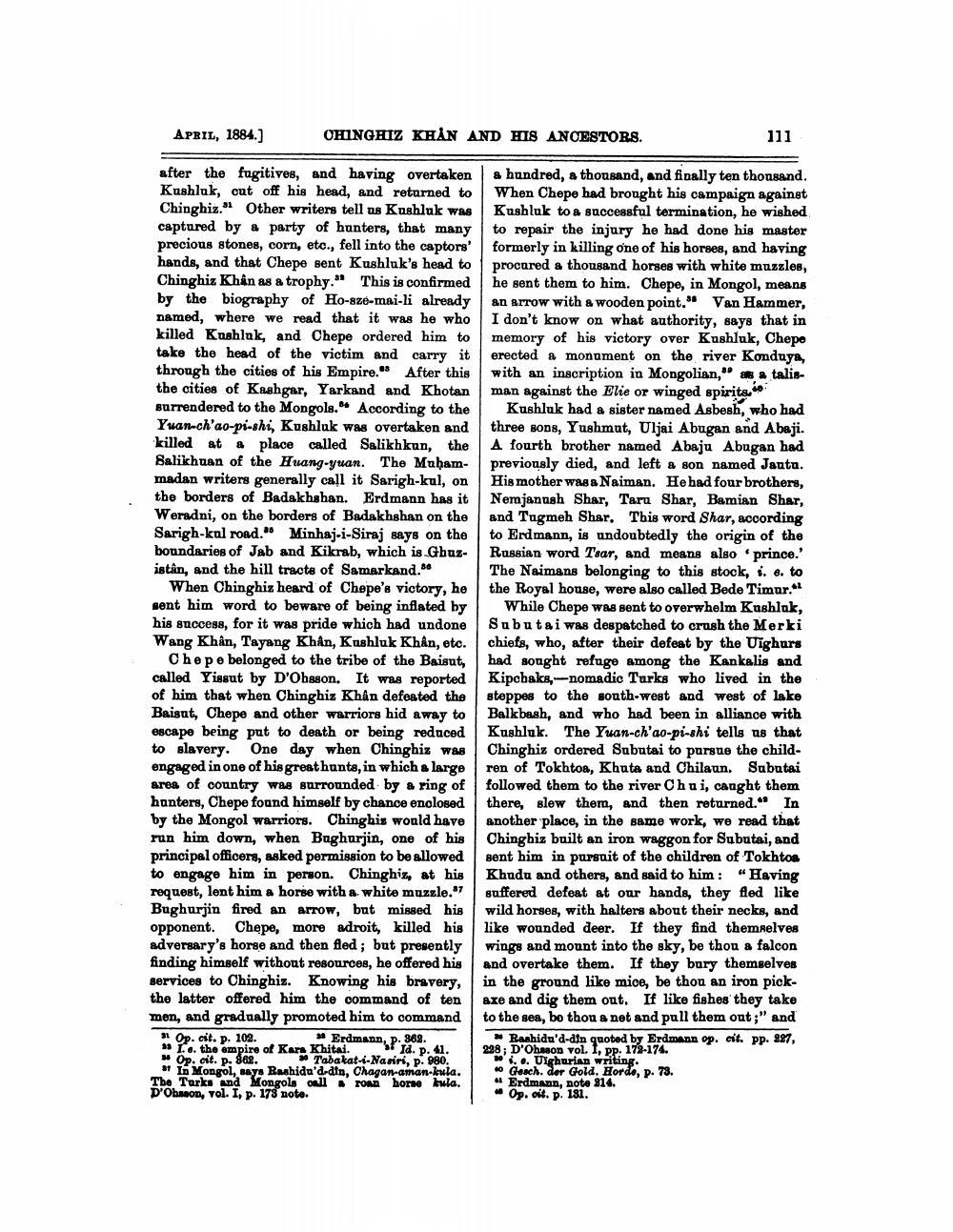________________
OHINGHIZ KHAN AND HIS ANCESTORS.
APRIL, 1884.]
after the fugitives, and having overtaken Kushluk, cut off his head, and returned to Chinghiz. Other writers tell us Kushluk was captured by a party of hunters, that many precious stones, corn, etc., fell into the captors' hands, and that Chepe sent Kushluk's head to Chinghiz Khân as a trophy." This is confirmed by the biography of Ho-sze-mai-li already named, where we read that it was he who killed Kushlak, and Chepe ordered him to take the head of the victim and carry it through the cities of his Empire. After this the cities of Kashgar, Yarkand and Khotan surrendered to the Mongols. According to the Yuan-ch'ao-pi-shi, Kushluk was overtaken and killed at a place called Salikhkun, the Salikhuan of the Huang-yuan. The Muhammadan writers generally call it Sarigh-kul, on the borders of Badakhshan. Erdmann has it Weradni, on the borders of Badakhshan on the Sarigh-kul road." Minhaj-i-Siraj says on the boundaries of Jab and Kikrab, which is Ghuzistân, and the hill tracts of Samarkand.
When Chinghiz heard of Chepe's victory, he sent him word to beware of being inflated by his success, for it was pride which had undone Wang Khân, Tayang Khân, Kushluk Khân, etc.
Chepe belonged to the tribe of the Baisut, called Yissut by D'Obsson. It was reported of him that when Chinghiz Khân defeated the Baisut, Chepe and other warriors hid away to escape being put to death or being reduced to slavery. One day when Chinghiz was engaged in one of his great hunts, in which a large area of country was surrounded by a ring of hunters, Chepe found himself by chance enclosed by the Mongol warriors. Chinghis would have run him down, when Bughurjin, one of his principal officers, asked permission to be allowed to engage him in person. Chinghiz, at his request, lent him a horse with a white muzzle." Bughurjin fired an arrow, but missed his opponent. Chepe, more adroit, killed his adversary's horse and then fled; but presently finding himself without resources, he offered his services to Chinghiz. Knowing his bravery, the latter offered him the command of ten men, and gradually promoted him to command Erdmann, p. 362.
31 Op. cit. p. 102.
33 I.e. the empire of Kara Khitai. af Id. p. 41. Op. cit. p. 862. Tabakat-i-Nasiri, p. 980.
In Mongol, says Rashidu'd-din, Chagan-aman-kula. The Turks and Mongols call a roan horse kula. D'Obsson, vol. I, p. 178 note.
111
a hundred, a thousand, and finally ten thousand. When Chepe had brought his campaign against Kushluk to a successful termination, he wished to repair the injury he had done his master formerly in killing one of his horses, and having procured a thousand horses with white muzzles, he sent them to him. Chepe, in Mongol, means an arrow with a wooden point." Van Hammer, I don't know on what authority, says that in memory of his victory over Kushluk, Chepe erected a monument on the river Konduya, with an inscription in Mongolian," as a talisman against the Elie or winged spirits.
Kushluk had a sister named Asbesh, who had three sons, Yushmat, Uljai Abugan and Abaji. A fourth brother named Abaju Abugan had previously died, and left a son named Jautu. His mother was a Naiman. He had four brothers, Nemjanush Shar, Taru Shar, Bamian Shar, and Tugmeh Shar. This word Shar, according to Erdmann, is undoubtedly the origin of the Russian word Tsar, and means also prince.' The Naimans belonging to this stock, i. e. to the Royal house, were also called Bede Timur.*1
While Chepe was sent to overwhelm Kushluk, Subutai was despatched to crush the Merki chiefs, who, after their defeat by the Uighurs had sought refuge among the Kankalis and Kipchaks,-nomadic Turks who lived in the steppes to the south-west and west of lake Balkbash, and who had been in alliance with Kushluk. The Yuan-ch'ao-pi-shi tells us that Chinghiz ordered Subutai to pursue the children of Tokhtoa, Khuta and Chilaun. Subutai followed them to the river Chui, caught them there, slew them, and then returned." In another place, in the same work, we read that Chinghiz built an iron waggon for Subutai, and sent him in pursuit of the children of Tokhtos Khudu and others, and said to him: "Having suffered defeat at our hands, they fled like wild horses, with halters about their necks, and like wounded deer. If they find themselves wings and mount into the sky, be thou a falcon and overtake them. If they bury themselves in the ground like mice, be thou an iron pickaxe and dig them out. If like fishes they take to the sea, be thou a net and pull them out ;" and
Rashidu'd-din quoted by Erdmann op. cit. pp. 227, 228; D'Ohsson vol. 1, pp. 172-174. 20. e. Uighurian writing.
o Gesch. der Gold. Horde, p. 73.
Erdmann, note 214.
Op. cit. p. 131.




